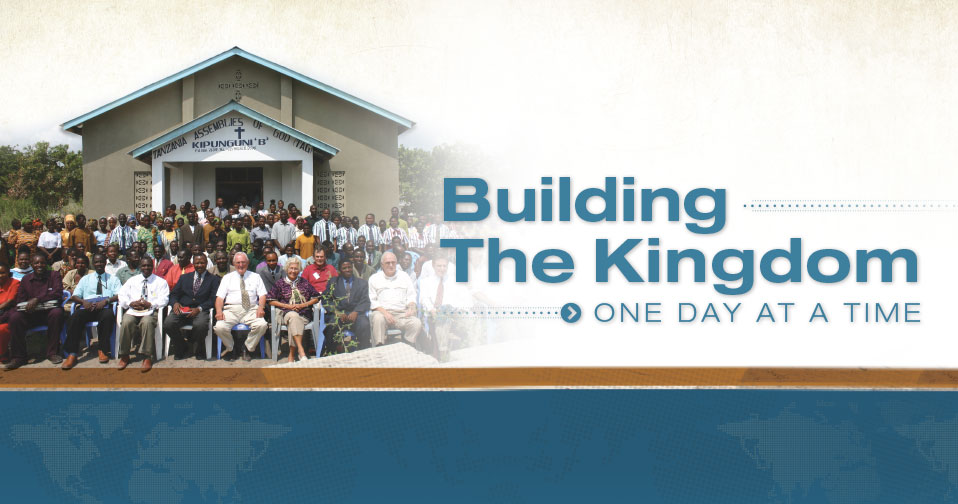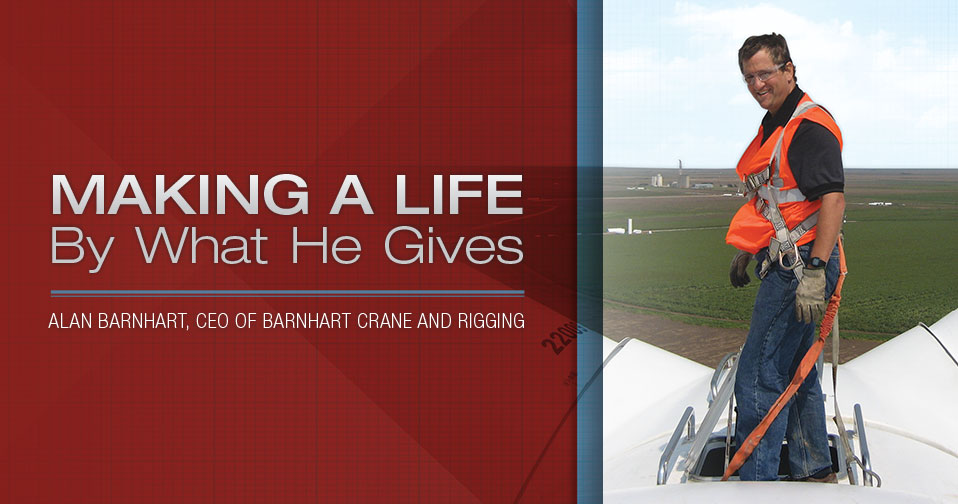Faith Can Work

Just outside the window of the LeTourneau University president’s office stands a new, two-story student center currently under construction. It is one of many transformations made in the past six years by the university’s new leader.
When Dr. Dale A. Lunsford assumed the presidency of LeTourneau University in Longview, Texas on July 1, 2007, he was the first new president in over two decades. His first year as president, he lived in an apartment on campus, eating meals with the students, attending their athletic events and worshipping with them at Sunday evening services.
Those experiences proved invaluable and led to improvements to dining facilities and athletic fields, aviation and engineering facilities, as well as construction of a new 200-bed residence hall on the university’s 162-acre campus in the piney woods of East Texas. The university also expanded its academic degree programs to be more comprehensive, while retaining its historically strong reputation in the STEM programs (science, technology, engineering and math).
Yet, one of the president’s first hurdles was to assure the school’s alumni all over the world that this Christ-centered university was steadfast in its commitment to its heritage. Lunsford led the university in 2008 to distill its identity in a new vision statement:
"Claiming every workplace in every nation as their mission field, LeTourneau University graduates are professionals of ingenuity and Christ-like character who see life’s work as a holy calling with eternal impact."LeTourneau University’s Vision Statement
“This mission is part of our DNA,” Lunsford said. “It goes back to our founder R.G. LeTourneau, who founded [the school] 65 years ago. He was not a pastor, not an evangelist, but was a highly successful businessman who worked in the earthmoving and offshore oil drilling industries. He was a man of great faith, and the institution was founded and continues to operate with the idea that the workplace is a place of ministry.”
LeTourneau University students are taught that excellence in their career field honors God, and the school’s strong reputation enables many of them to graduate with several offers in hand because of emphasis on work ethic and practical, hands-on learning.
“We are called in all that we do to be God-honoring, and that means God gets the very best of our effort,” Lunsford said. “As people of faith, we should be the market leaders in everything we do. We should be challenged to be the very best. The question is not: Am I going to be successful, or am I going to be a godly man? You’re going to do both. In fact, your success is going to point to and honor God. It’s not a choice.”
"Profit is not a bad thing. Success is not a bad thing. And being the number one in market share is not an ungodly thing at all...It is about the way you do it."Dr. Dale Lunsford, President of LeTourneau University
It is about the culture. It’s about standing on the conviction that we can be a loving, God-honoring, affirming culture and still be very successful. Some don’t think Christian values will work in business, so they don’t try it. We beg to differ.”
Every workplace in every nation is a mission field, a place of ministry.
“Our goal is that every graduate who leaves here is a minister, everyone is an evangelist, but not in the traditional sense to go off to be on a church payroll somewhere,” Lunsford said. “Our graduates are civil engineers, they are airline pilots, they are teachers in public school systems, they are business people and CPAs. And from that context, they bring God’s love to the world. That makes LeTourneau a very unique place among Christian higher education.”
Churches are having a declining impact on communities, Lunsford said. One of the big reasons is because Christian professionals have a disconnect between Sunday and Monday.
“They might be faithful, worshipful, prayerful, giving people, and leaders in their church,” he said. “But many don’t see that their faith informs the way they should run their business Monday through Friday. This means we miss that opportunity to impact our culture.”
Because we see work and success differently here, “we have alumni who are out there quietly changing the world,” Lunsford said.
Examples Lunsford cites include LeTourneau alumni like Bob Walker, who manufactures lawnmowers, and Paul Abbott, who builds aircraft engines. They see their work as valuableto God.
“They are running their businesses in a godly way and through that, are changing the lives of their employees, their customers, their suppliers and all the people who do business with them.”
Lunsford pointed out that in our culture today, when the great crises of life happen, when their marriage is in trouble, their doctor gives them a bad test result, their children are in trouble and struggling, they are often more likely to talk to their friend in the next cubicle than seek out a pastor.
“It is at that point that a godly professional who came to work that morning realizing that their workplace is their place of ministry, really gets to speak God’s truth and demonstrate God’s love in a way that a pastor might not have the opportunity to do,” Lunsford said.
“Many Christians have this mistaken worldview that God has a varsity team of people like Rick Warren, Tim Tebow, Billy Graham and even their local pastor,” Lunsford said, “and that they serve on the junior varsity team when it comes to sharing about faith.”
“We sit on the bench most of the time,” Lunsford said. “We think maybe God will call us in for a special punt or kickoff return now and then. We believe our job is to sit on the bench, to cheer on the varsity team, to write checks to support the varsity team, but that it’s not really our game to play.”
“That’s just a lie,” Lunsford said. “It’s not in any way biblical.”
“If you can go to work and see your workplace as your place of ministry, it changes everything,” Lunsford said. “Every relationship is different after that. Every decision is different after that. It truly is a world-changing decision. And that’s our goal at LeTourneau University. That’s what we equip our students to do.”
LeTourneau University faculty are role models who lead each class with a devotional. “Our faculty have been called for a career in education. They’re smart, bright people with graduate degrees, but whether they are teaching chemistry or engineering, they see their work as a holy calling, too,” he said. “Their classroom is their place of ministry, and so it starts with our faculty, and then it is also reflected in chapel services and other programs, too.”
As an outreach to expand on this faith and work integration, LeTourneau University launched the Center for Faith and Work in 2011 to educate students, churches and Christians throughout the marketplace on how to effectively integrate their Christian faith and professional calling.
Lunsford named Bill Peel to serve as executive director of the center. Peel, who has written several books on the subject and speaks widely on it, is a natural fit.
“Our work matters to God,” Peel said. “Many people are surprised to learn that God considers their daily work just as significant as a pastor or missionary’s work. People do better work when their labor carries a sense of calling. That’s something that most employers can’t give, and many churches often neglect.”
“Pastors have people in their congregations for a maximum of five hours a week, and for many, it’s only one hour,” Peel said. “Yet these same people spend 40 hours minimum, sometimes 70 hours a week, in their workplaces. So who is being more influential in their lives?”
The Center for Faith & Work extends LETU’s message in two directions, inwardly to the students and outwardly to Christian professionals and pastors by providing resources at its extensive website, www.CenterForFaithAndWork.com. The website stays current with rich resources for anyone to gain a new sense of their own calling through their work. It is fast becoming a go-to resource for helping people rethink issues of business and faith.
"We want to challenge, equip and provide vision for professionals to take Christ into their workplaces. We want to change the business culture. Faith gives you the ability to love people and care about them. Separating faith and work is bad for business as well as bad theology."Bill Peel, Executive Director of the Center For Faith And Work
The center also brings business leaders to speak on campus to interact with students, as well awarding R.G. LeTourneau Faith and Work Scholars.
“The Center connects LeTourneau University to Christian professionals everywhere,” Lunsford said. “And we bring a lot of them to campus to talk about how their Christian faith changes the way they look at business opportunities and the way they define success.”
“They have stories to tell about what it looks like when you let Christ be the Lord of your workplace,” Lunsford said. “What does it look like in a landscape business? In a law firm? In a dental practice? In an aviation company?”
“Our ultimate measure of success is to be faithful to our call, to claim every workplace and every nation for Jesus,” Lunsford said. “What inspires me is to hear the stories about how our graduates are faithfully tackling the question, ‘how do I make Christ the Lord of my work?’ It’s not an easy thing to answer. It’s a complicated question. And it looks a little different in every business and in every industry and in every life.”

By: Lisa Huetteman
Lisa Huetteman is Co-founder of Black Diamond Associates, Executive Coach, Speaker and Author of the book: The Value of Core Values: Five Keys to Success through Values-Centered Leadership.
Read More Articles by Lisa Huetteman





